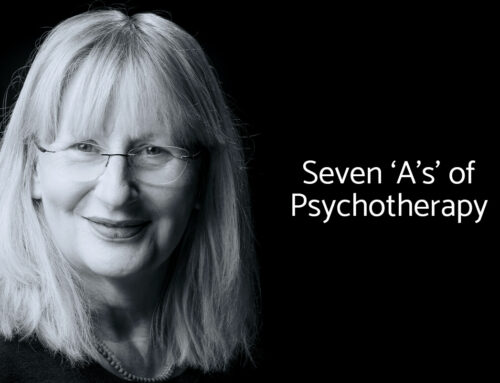We continue our occasional series on central concepts in psychotherapy.
What does “Holding” mean in therapy?
In psychotherapy, holding refers to emotional and mental holding. The therapist offers emotional holding is being present with you, recognising and understanding what you are feeling, in a respectful, safe and accepting way.
–
The concepts of holding and containing developed from observations of mothers caring for their young children. One of the things good mothers do is help children to feel safe and confident by managing their upset feelings for them. The child is not left to struggle with difficult feelings alone, as the mother helps the child to make sense of her feelings and learn to manage them. In therapy, the therapist will help you manage emotions that you feel you are not coping with, such as confusion, depression, anxiety or anger. The way this is done is through offering a holding relationship, where the therapist is reliably present, consistent, present, safe and trustworthy, and is attuned to your individual emotional climate.
Holding is a word psychotherapists use to denote a very specific meaning that comes from developmental psychology. it’s a term that has evolved a symbolic meaning, and is related to the idea of containment discussed in a previous article.
Infants benefit from being picked up, carried around and cuddled as much as possible. This normal high level of frequent physical contact helps them to feel secure and to thrive. We know about the importance of this kind of physical contact from the devastating effects that are created by its absence – children cannot feel secure, safe and loved without warm contact. The effects of its absence are directly traumatic and, depending on the severity, the absence of warm contact in childhood affects adult behaviour in close relationships. Our understanding of the importance of holding has partly developed from the observation of infants and young children and the effects of close contact, or its absence. As a child grows older, the mother will cease picking her up every time she cries, because she knows the child has internalised the good sense that mother is there for her, and will be able to cope with minor upsets independently. But if a child was not comforted sufficiently when she was younger, she may not ever cope so well with upsets and may need to resort to self-soothing strategies to manage her feelings.
In psychotherapy, holding refers to emotional and mental holding. The therapist offers emotional holding is being present with you, recognising and understanding what you are feeling, in a respectful, safe and accepting way. A therapist will not change the subject and ask you what you had for lunch if you say you feel a bit sad today! He will stay present with you with whatever you are feeling, and also show that he is interested and he accepts your feelings – they are both real and important. By staying present and attentive to your feelings, he enables you to do the same for yourself – feelings that you found difficult to articulate or cope with can become much easier to make sense of.
Mental holding is more like “holding you in mind”. The therapist is attentive and present to thoughts about you. He remembers you and thinks about you between sessions and does not forget all about you between sessions. He remembers some important details about things you have told him, and makes connections between things that are occurring for you now and things that occurred in your past. Mental holding is about the ability to make connections, or bridges, between different aspects of experiencing. By doing this with you, the therapist facilitates you to be able to think more freely about yourself, and revise your concepts of who you think you are, so you find it easier to solve problems and tackle things that you want to achieve
So how does your personal history of being held affect your relationships as an adult?
It’s possible that your own experience will modulate what you experience as a desirable and normal level of intimacy and familiarity, as well as casual daily physical contact such as hugs. Some people say that they are “not a touchy-feely type of person”, which might be a way of describing the fact they are less comfortable with overt displays of affection or closeness, and they like to maintain a distinct sense of their own personal space. Other people can feel that they are never fully satisfied by the level of closeness and contact they experience. You are likely to repeat the way in which you were parented with your own children, until it comes into your conscious awareness, whether you pick up a child the moment they start to cry or feel that it is better to leave them to sort it out for themselves.
And how does holding come into the therapy room?
The therapist will hold you in a way that is consistent and attentive, but not overwhelming. He will be careful to attune to you and the level of emotional and mental contact you feel comfortable with.
The therapist can see aspects of your emotional history fairly clearly, even before you have spent much time together. He will notice the ways in which you respond to what he says to you. For example if he says something kind or complimentary, do you bat it away or ignore it, do you feel irritated that he is flattering you, does it make you cry, or do you receive it and reflect upon how it makes you feel? He is really interested in reading all the clues that evoke the kind of emotional climate you create around yourself. Clients who have not experienced sufficient secure holding as children may not even recognise what the therapist is offering, and think he is just being “nice” – and it can take some time to find out what holding is and what it feels like.
The therapist will attempt to provide a holding environment during your time together. This refers to both the physical space, which is private and protected, and the therapeutic relationship, wherein you are supported and safe. Because of the steady presence and calm attention of the therapist, you are able to explore and express emerging feelings and thoughts which may be more accessible to you in this space because you are offered empathy and acceptance. At the same time as tuning in to your emotional world, the therapist also stays grounded as themselves, so he continues to feel safe and confident even if you feel a bit overwhelmed by your feelings.
This aspect of therapy can sometimes surprise clients, as they find themselves easily discussing feelings and experiences which they have never felt able to disclose before. When you have the experience of being held in this way, you can often very quickly see yourself more clearly, and re-organise yourself internally. Through this process you get to know yourself better and revise your self-concept so that you feel more up-to-date with where you want to be in your life. This can save you a lot of time, as you can move quite swiftly through emotional blocks that were holding you up.
Photo credit : Lane Jackman




